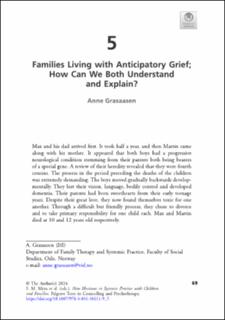| dc.contributor.author | Grasaasen, Anne | |
| dc.date.accessioned | 2023-10-30T13:26:46Z | |
| dc.date.available | 2023-10-30T13:26:46Z | |
| dc.date.created | 2023-10-16T22:37:45Z | |
| dc.date.issued | 2023 | |
| dc.identifier.citation | Grasaasen, A. (2024). Families Living with Anticipatory Grief; How Can We Both Understand and Explain?. In: Myra, S.M., Grøver, T., Axberg, U. (eds) New Horizons in Systemic Practice with Children and Families. Palgrave Texts in Counselling and Psychotherapy. Palgrave Macmillan, Cham. | en_US |
| dc.identifier.isbn | 978-3-031-38111-9 | |
| dc.identifier.uri | https://hdl.handle.net/11250/3099467 | |
| dc.description | This chapter is licensed under the terms of the Creative Commons Attribution 4.0 International License (http://creativecommons.org/ licenses/by/4.0/), which permits use, sharing, adaptation, distribution and reproduction in any medium or format, as long as you give appropriate credit to the original author(s) and the source, provide a link to the Creative Commons license and indicate if changes were made. The images or other third party material in this chapter are included in the chapter’s Creative Commons license, unless indicated otherwise in a credit line to the material. If material is not included in the chapter’s Creative Commons license and your intended use is not permitted by statutory regulation or exceeds the permitted use, you will need to obtain permission directly from the copyright holder. | en_US |
| dc.description.abstract | Illness as a phenomenon consists of both physiological conditions and narratives. When children have serious illnesses and death becomes the frame of family life, systemic perspectives can expand causal explanations by providing descriptions of illness within a frame of relational values. In encounters with parents dealing with anticipatory grief, therapists must attempt to create alliance also with scientific discourses. Only then can we offer the best care to families who need us to both explain and understand. Social constructionism as a scientific theoretical perspective offers dialogue and philosophical ideas about how to create an interdisciplinary practice. Cooperation across disciplines can also improve our ability to be relationally engaged with those we are to help. | en_US |
| dc.language.iso | eng | en_US |
| dc.publisher | Palgrave Macmillan | en_US |
| dc.relation.ispartof | New Horizons in Systemic Practice with Children and Families | |
| dc.rights | Navngivelse 4.0 Internasjonal | * |
| dc.rights.uri | http://creativecommons.org/licenses/by/4.0/deed.no | * |
| dc.subject | illness | en_US |
| dc.subject | children | en_US |
| dc.subject | death | en_US |
| dc.subject | families | en_US |
| dc.subject | anticipatory grief | en_US |
| dc.title | Families living with anticipatory grief; how can we both understand and explain? Chapter 5 | en_US |
| dc.type | Chapter | en_US |
| dc.description.version | publishedVersion | en_US |
| dc.rights.holder | © 2024 The Author(s) | en_US |
| dc.source.pagenumber | 69-82 | en_US |
| dc.identifier.doi | https://doi.org/10.1007/978-3-031-38111-9_5 | |
| dc.identifier.cristin | 2185305 | |
| cristin.ispublished | true | |
| cristin.fulltext | original | |
| cristin.qualitycode | 2 | |

